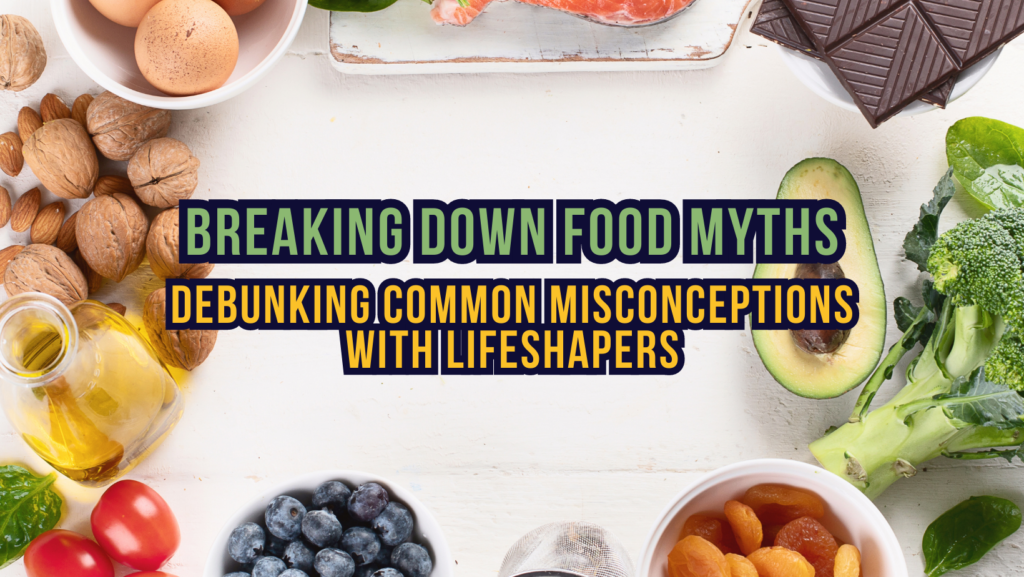In the world of nutrition, there’s no shortage of myths and misconceptions. With an abundance of conflicting information available, it can be challenging to separate fact from fiction. Lifeshapers is here to help. Our mission is to empower people to make informed decisions about their diet and health, and debunking common food myths is an essential part of that process.
I. The Dangers of Food Myths
A. The impact of misinformation on overall health
Misinformation about nutrition can have serious consequences for our health. Believing in food myths may lead us to make poor dietary choices, resulting in nutrient deficiencies or even chronic health issues.
B. How food myths can hinder weight loss and wellness goals
Falling for food myths can impede our weight loss efforts, as we may adopt unhelpful or even harmful practices. To achieve long-term success, it’s crucial to rely on evidence-based strategies.
C. The role of Lifeshapers in providing accurate information and guidance
Lifeshapers provides accurate, science-backed information to help clients achieve their health and weight loss goals. By debunking food myths, we empower individuals to make educated choices about their diet.
II. Top 10 Food Myths Debunked
Myth #1: Carbohydrates are the enemy
Truth: Carbohydrates are essential for energy and proper brain function. Instead of avoiding carbs altogether, focus on consuming complex carbs from whole grains, fruits, and vegetables, which provide essential nutrients and fiber.
Myth #2: Fat should be avoided at all costs
Truth: Not all fats are created equal. While trans and saturated fats should be limited, healthy fats found in nuts, seeds, avocado, and fish are vital for brain health, hormone regulation, and nutrient absorption.
Myth #3: Skipping meals can help you lose weight
Truth: Skipping meals can lead to increased hunger, causing overeating later. A consistent eating schedule that includes balanced meals is more effective for weight management.
Myth #4: Eating late at night leads to weight gain
Truth: Weight gain results from consuming more calories than you burn, not the time of day you eat. It’s essential to focus on your overall daily caloric intake and nutrient balance rather than meal timing.
Myth #5: All calories are created equal
Truth: While calories are a measure of energy, the nutritional value of foods varies. Focusing on nutrient-dense whole foods rather than just counting calories is crucial for a healthy diet and weight loss.
Myth #6: Certain foods can “boost” your metabolism
Truth: While some foods like spicy peppers may have a minimal effect on metabolism, the impact is usually temporary and insignificant. The key to boosting metabolism lies in maintaining a balanced diet and regular physical activity.
Myth #7: Gluten-free diets are healthier for everyone
Truth: Gluten-free diets are necessary for those with celiac disease or gluten intolerance. However, for others, avoiding gluten may lead to a less varied and balanced diet, as they may miss out on essential nutrients found in whole grains.
Myth #8: Dairy products cause weight gain and should be avoided
Truth: Dairy products can be a part of a healthy diet when consumed in moderation. They are rich in calcium, protein, and other essential nutrients. Opt for low-fat or fat-free options if weight management is a concern.
Myth #9: Detox diets and cleanses are necessary for weight loss
Truth: Our bodies have natural detoxification systems, and there’s no scientific evidence to support the effectiveness of detox diets or cleanses. Instead, focus on consuming a balanced diet rich in fruits, vegetables, and whole grains to support overall health.
Myth #10: You must drastically cut calories to lose weight effectively
Truth: Extreme calorie restriction can lead to muscle loss, slowed metabolism, and nutrient deficiencies. A more sustainable approach is to create a moderate calorie deficit while consuming nutrient-dense foods and engaging in regular physical activity.
III. Lifeshapers’ Principles for Healthy Eating and Weight Loss
A. Balanced and nutritious meals
B. Importance of portion control
C. Emphasizing whole, unprocessed foods
D. Understanding the value of macronutrients and micronutrients
E. The role of physical activity and mental well-being in weight loss
IV. Tips for Recognizing and Avoiding Food Myths
A. Analyzing the source of information
Before trusting any nutrition advice, consider the source. Look for information backed by scientific research and written or reviewed by reputable health professionals.
B. Fact-checking and seeking expert advice
Always verify the information you come across, and don’t hesitate to consult a registered dietitian or nutritionist for personalized guidance.
C. Staying informed on the latest nutrition research
Keep up to date with current research and be open to adjusting your beliefs as new evidence emerges.
D. Becoming an informed consumer and reading food labels
Learn to read and understand food labels to make healthier choices at the grocery store.
E. Turning to Lifeshapers as a reliable resource for dietary guidance
Lifeshapers offers evidence-based advice and personalized support to help you navigate the world of nutrition and make the best choices for your health.
Conclusion:
Debunking food myths is essential for maintaining a healthy lifestyle and achieving lasting weight loss. By arming yourself with accurate information and following evidence-based strategies, you can make informed decisions about your diet and well-being. Lifeshapers is here to help guide and support you on your journey towards better health.
Are you ready to break free from food myths and embrace a healthier, happier life? Learn more about Lifeshapers

